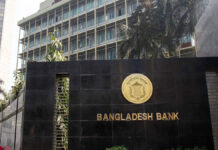Bangladesh ahead in all three criteria set by UN for becoming a developing country

Bangladesh is going to compete in the second review of a UN panel next year for graduation to a developing country from a least developed one as it met all the three criteria for getting out of the LDC bloc.
Dhaka has already sent the latest status report on the three eligibility criteria — Gross National Income (GNI) per capita, Human Assets Index (HAI) and Economic Vulnerability Index (EVI) — to the UN Committee for Development Policy (CDP) that makes assessment for the graduation on the basis of the indices.
In all the three criteria, Bangladesh is well ahead of the required thresholds. It has performed better in two categories — GNI and HAI — than that in 2018 when it got the first recommendation from the CDP for graduating to a developing country.
However, the country’s position in the third criterion fell, yet it’s much above the required threshold.
The UN committee took data from March 2018 to April this year as per the timeframe it set for assessing Bangladesh’s progress in its second review. This means the impact of the Covid-19 pandemic on the country’s economy has not been taken into account.
According to the UN’s graduation threshold, the GNI per capita of a country has to be $1,230 or above. Bangladesh’s GNI per capita is now $1,640 — well above the ceiling. The per capita income was $1,272 during the last triennial review in 2018.
In terms of the HAI, a country must have a score of 66 or above. Bangladesh has performed better than it did in 2018 as its score has risen to 75.3 from 72.8. The HAI is an indicator of nutrition, health, adult literacy and secondary school enrolment rate.
In the EVI criterion, a country’s score has to be below 32. Bangladesh’s score is 27.3 against 25 two years ago.
The EVI is a composition of some indicators such as instability of agricultural production and exports of goods and services, population size, and share of agriculture, forestry and fisheries in gross domestic product. The lower a country scores in this index the better it performs.
Officials at the Economic Relations Division think that the inclusion of a few indicators in this criterion by the CDP at the beginning of this year resulted in the fall in Bangladesh’s performance.
The CDP will scrutinise Bangladesh’s progress towards the graduation for the second time at its triennial review in February next year. The country’s official graduation from the LDC category will take place after a three-year transition period.
If the country maintains its position in all the three categories for the next three years, it will be recognised as a developing country in the UN General Assembly in 2024.
“We believe that Bangladesh will get the recommendations in the second review as well because we meet all the prerequisites for the graduation,” a top official of the ERD told The Daily Star, seeking anonymity.
Introduced by the UN in 1971, the LDC category is characterised by low levels of income and severe structural impediments to sustainable development. There were 25 LDCs at that time. In 2018, the number increased to 47.
Bangladesh was included in the LDC list in 1975. In 2015, it crossed the threshold of the World Bank-defined lower middle-income country and became eligible for graduation in 2018.
ERD officials said the CDP will hold a meeting next month where Bangladesh will present the progress towards its transition to a developing country. In the meeting, the UN committee will hold discussions on economic vulnerability assessment it made recently in the wake of the pandemic.
In January next year, a group of CDP experts will meet again to review Bangladesh’s position on the indices.
Upon getting the experts’ views, the CDP will hold the triennial review on February 7, 8, and 9 and recommend Bangladesh’s name for the graduation if the country passes the assessment.
If Bangladesh gets out of the LDC bloc in 2024, it will be given a three-year transition period before it loses duty-free and quota-free market access to the European Union under the Everything but Arms initiative for LDCs, according to the CDP.
The benefits of technical cooperation and other forms of assistance such as fund support for scholarship, fellowship, participation in special training as well as research will be withdrawn. The scope for credit accessibility will also be reduced.
According to an impact assessment on LDC graduation by the Planning Commission last year, the country would lose $7 billion in export earnings every year after the end of the transition period.
By 2031, the amount would balloon to $13 billion, it said.
A taskforce which has been working on Bangladesh’s LDC graduation process is also assessing the implications for the country’s economy following its graduation to a developing country.
ERD officials said considering the economic fallout of the pandemic, the government wrote to the CDP and requested it to keep the duty-free export facilities and other benefits for Bangladesh till 2030.
They also mentioned that the UN may extend the transition period by two more years till 2026, considering the impacts of the pandemic on the economy.
Bangladesh is in talks with international bodies, such as the LDC Group of the World Trade Organisation, for export duty waivers on its products, added the officials.









